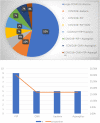Risk factors and multi-pathogen infections in kidney transplant recipients with omicron variant pneumonia: a retrospective analysis
- PMID: 38834974
- PMCID: PMC11151468
- DOI: 10.1186/s12879-024-09444-4
Risk factors and multi-pathogen infections in kidney transplant recipients with omicron variant pneumonia: a retrospective analysis
Abstract
Background: Kidney transplant recipients (KTRs) are at an elevated risk of progressing to severe infections upon contracting COVID-19. We conducted a study on risk factors and multi-pathogen infections in KTRs with SARS-CoV-2 Omicron variant.
Methods: KTRs were subjected to a thorough etiological evaluation. Whenever feasible, they were also provided with bronchoscopy and bronchoalveolar lavage to enable metagenomic next-generation sequencing (mNGS), ideally within a 48-hour window post-admission. We performed a retrospective analysis for pathogens and risk factors of KTRs with the COVID-19 virus variant Omicron.
Results: We included thirty patients in our study, with sixteen exhibiting single infection of COVID-19 and fourteen experiencing co-infections, predominantly with Pneumocystis jirovecii. Notably, patients with severe cases demonstrated significantly elevated levels of C-reactive protein (CRP) and interleukin-6 compared to those with moderate cases (P < 0.05). Furthermore, individuals whose conditions progressed had markedly higher baseline serum creatinine levels than those without such progression (P < 0.05). The presence of heart failure, acute exacerbation of renal dysfunction, and a history of opportunistic infections were significantly associated with a higher likelihood of deterioration and hospital admission due to the SARS-CoV-2 Omicron variant, as compared to the control group (P < 0.05). In subsequent follow-up analysis, the all-cause rehospitalization rate was observed to be 21.4%, with Pneumocystis jirovecii infection accounting for half of these cases.
Conclusion: Among KTRs, a significant coinfection rate of 47% was observed, with Pneumocystis jirovecii emerging as the predominant pathogen in these cases. The development of heart failure, acute exacerbation of chronic renal dysfunction, and a prior history of opportunistic infections have been identified as potential risk factors that may contribute to clinical deterioration in KTRs. Additionally, Pneumocystis jirovecii infection has been established as a critical factor influencing the rate of all-cause rehospitalization within this patient population.
Keywords: COVID-19 virus variant Omicron; Coinfections; Kidney transplant recipients; Risk factors.
© 2024. The Author(s).
Conflict of interest statement
The authors declare no competing interests.
Figures




Similar articles
-
Epidemiology and risk factors associated with Pneumocystis jirovecii pneumonia in kidney transplant recipients after 6-month trimethoprim-sulfamethoxazole prophylaxis: A case-control study.Transpl Infect Dis. 2020 Apr;22(2):e13245. doi: 10.1111/tid.13245. Epub 2020 Jan 24. Transpl Infect Dis. 2020. PMID: 31943590
-
Application of metagenomic next-generation sequencing in the diagnosis and treatment guidance of Pneumocystis jirovecii pneumonia in renal transplant recipients.Eur J Clin Microbiol Infect Dis. 2021 Sep;40(9):1933-1942. doi: 10.1007/s10096-021-04254-x. Epub 2021 Apr 21. Eur J Clin Microbiol Infect Dis. 2021. PMID: 33880744 Free PMC article.
-
Successful management of concurrent COVID-19 and Pneumocystis Jirovecii Pneumonia in kidney transplant recipients: a case series.BMC Pulm Med. 2023 Nov 21;23(1):458. doi: 10.1186/s12890-023-02764-2. BMC Pulm Med. 2023. PMID: 37990199 Free PMC article.
-
Pneumocystis jirovecii and Nocardia pneumonia in a middle-aged male with Nephrotic syndrome: a case report and literature review.BMC Infect Dis. 2024 Sep 30;24(1):1071. doi: 10.1186/s12879-024-09987-6. BMC Infect Dis. 2024. PMID: 39350124 Free PMC article. Review.
-
Pneumocystis jirovecii in solid organ transplant recipients: updates in epidemiology, diagnosis, treatment, and prevention.Curr Opin Infect Dis. 2024 Apr 1;37(2):121-128. doi: 10.1097/QCO.0000000000001002. Epub 2024 Jan 17. Curr Opin Infect Dis. 2024. PMID: 38230604 Review.
Cited by
-
Fungal Infections in Transplant Recipients Pre- and Post-coronavirus Disease 2019: Results from a Single-Center Retrospective Cohort Study.Mycopathologia. 2025 May 30;190(3):47. doi: 10.1007/s11046-025-00957-3. Mycopathologia. 2025. PMID: 40447921
References
-
- New Coronavirus Infection Diagnosis and Treatment Plan. (China Trial Version 10). https://www.gov.cn/zhengce/zhengceku/2023-01/06/content_5735343.htm[accessed 5 January 2023].
MeSH terms
Supplementary concepts
LinkOut - more resources
Full Text Sources
Medical
Research Materials
Miscellaneous

